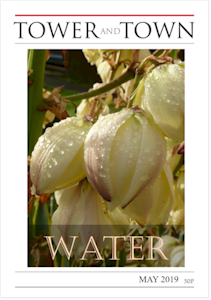

Tower and Town, May 2019 (view the full edition) (view the full edition)Clergy Letter: A Question Of Faith'Those who drink of the water that I will give them will never be thirsty' - John 4.10 In the human quest to find extra-terrestrial life, life outside the earth, the search for water has been crucial. NASA's motto in the pursuit of extra-terrestrial life has been 'follow the water'. Why? Because, as far as we know, liquid water is essential to all life on earth, and therefore we assume it may well be essential to life outside our planet as well. Given the fact that we cannot live without water, it is no surprise that in most world religions, including Christianity, water has a major role to play. It can be a threat: both gods and creatures have been thought to hide in seas and lakes, representing the dangers that people experience at sea. The power of gods and God has been shown in having power over water, such as the parting of the Red Sea and Jesus calming the storm. Water also is the symbol of purity and healing. Just as we clean and refresh our bodies with it, also through ritual our souls can be cleansed and made whole; Baptism exemplifying this in the Christian tradition. Another famous example is the water that flows out of the spring in Lourdes, or the Zamzam water in Mecca, which is claimed to have healing power for those who drink it or bathe in it. However, in cases of these 'healing miracles', often the claim is made that it is only the spiritual wholeness of the person that is achieved, the physical recovery being a consequence of this. For some of us, an understanding of the connections between the physical and the spiritual, can diminish the power of ritual and worship, and ultimately persuade us that God Himself is a product of human imagination. But what if it is the other way around? If these connections are not obvious because we made them, but instead are obvious because they are part of the fabric of the life that God created. This by no means implies a literal reading of any creation story, but an acknowledgement that the world in which we live has both a natural and divine order. The natural order we can see all around us, in the universals of life, such as our need for water. The divine order we can discern in the particular, such as the water of Baptism or sacred springs. Does the natural enhance or diminish the sacred? Do they exclude or depend on each other? That is the question we need to answer for ourselves; that is the question of faith. Janneke Blokland |